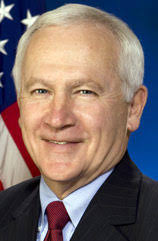Editor’s note: State Sen. Gene Yaw of Pennsylvania’s 23rd District and U.S. Congressman Fred Keller, representing Pennsylvania’s 12th District, have been warning us for years that reversing or halting the progress of natural gas production and exportation would undermine national security. This past week, they have doubled down on their messages to Pennsylvania’s Gov. Wolf and those seeking a swift transition from fossil fuels to supposedly cleaner, yet costly, alternative energy sources. Their most recent op-eds are posted here back-to-back.
American Energy is Key to Undermining Putin’s War
By Sen. Gene Yaw
Russian President Vladimir Putin’s bloody and unhinged campaign to topple a democratic nation once subjugated by the former Soviet Union has resurrected the threat of global conflict from its deep, dark Cold War-era grave.
It’s easy to paint the invasion of Ukraine as the delusions of a narcissistic despot desperate to cement his legacy as the man who muscled Russia’s way back to the top of the world superpower list. In doing so, we ignore the uncomfortable truth: Putin spent years bolstering Russia’s economy with oil and gas exports, knowing full well the West’s race to renewables left them vulnerable and dependent.
As a natural consequence, any imposed sanctions meant to cripple Russia’s energy sector will reverberate across the globe, cutting countries in the North Atlantic Treaty Organization (NATO) the deepest.
This is what I, and many others, mean when we say energy independence is a matter of national security. And this is why short-sighted climate policies – like forcing Pennsylvania into the Regional Greenhouse Gas Initiative (RGGI) and canceling natural gas and oil infrastructure, the Keystone XL pipeline chief among them – are so very dangerous. People across the world, not just in Ukraine, will die from the leverage Russia holds over global energy exports.
How much control does Russia have, exactly? The EU is the largest importer of natural gas in the world and 53% of their supply came from Russia in 2020 alone. In the United States, about 11% of our crude oil imports came from Russia last year – a smaller, albeit significant chunk that will cause financial pain stateside as the war against Ukraine escalates.
Some analysts believe crude oil prices may reach $150 per barrel this summer, up from roughly $50 just two years ago when American energy policy prioritized independence.
President Trump, love him or hate him, cautioned western Europe about the risks of relying on Russian natural gas. Germany ignored those warnings and closed much of its nuclear and coal generation facilities in an effort to reduce carbon emissions. Unfortunately, Germany now finds itself in a very serious dilemma of failing to recognize the importance of natural gas in its decisions.
Germany isn’t alone in its shortsightedness. Democratic leaders in western nations, acting on behalf of wealthy green energy donors, fail to see the big picture time and time again. It doesn’t matter how many countries signed the Paris Climate Agreement if all of them also allow China to ramp up its emissions over the next decade.
Pollution knows no borders. Renewable energy accounts for less than one third of global energy supply and remains notoriously unreliable. That’s why, in addition to fueling the EU, Russia made a lucrative deal to supply China with 100 million tons of coal.
We can attack Putin’s assets and Russia’s banks all we want, but so long as he’s cornered a sector of the energy market, his imperialist ambitions will not subside.
But all is not lost. The United States can change course. We can ramp up energy production with the same urgency we experienced when manufacturers pivoted to make masks and ventilators at the onset of the pandemic. We can ease Biden-era policies meant to restrict oil and gas production and exports. We can greenlight Keystone and other pipelines. And we can unleash our plentiful gas supply right here in Pennsylvania to help with that mammoth effort.
Pennsylvania, according to the Energy Information Administration, remains number two in natural gas production nationwide and became the largest supplier of electricity in the United States in 2020. In Pennsylvania alone, more than half of households use natural gas to stay warm. Our 49 underground storage sites also remain key to meeting regional demand in winter.
That’s why Gov. Tom Wolf must abandon policies meant to hamstring the industry, like his devotion to RGGI or his alignment with New York on halting infrastructure that could supply New England with cleaner, cheaper Pennsylvania natural gas instead of – you guessed it – Russia’s inferior product.
But Wolf isn’t the only one standing in the way. Our country still bans liquified natural gas (LNG) cargo ships from delivering between domestic ports unless registered in the United States. Of the more than 400 existing LNG carriers, none fly the U.S. flag.
This law, known as the Jones Act, was enacted in 1920 and leaves us entirely dependent on foreign transports to deliver LNG when pipelines aren’t feasible. The same law prevented production facilities in the southern U.S. from delivering to Puerto Rico after Hurricane Maria ravaged the island in 2017.
Think of how much the world has changed in a century, let alone from just a year or two ago. Where is the logic in buying from a hostile nation instead of adopting policies that make it easier to use what we produce ourselves? Is there any recognition of the common good – or are we just nuts?
Russia has now weaponized its natural gas supply and soon it will squeeze ancillary industries like fertilizer manufacturing and ultimately, food production. If you control the food supply, you control the people. It’s a brutal tactic Russian dictators of decades past know all too well.
Our elected officials must set aside their allegiance to green energy lobbyists and turn up gas production so that we can crush Putin’s war machine without setting a single foot on foreign soil. As a nation that prides itself on its staunch defense of liberty, we must not undermine Ukraine’s fight for freedom by bankrolling their aggressor. And natural gas is the most valuable commodity Russia has – for now.
Senator Gene Yaw was elected to represent the 23rd Senatorial District consisting of Bradford, Lycoming, Sullivan, Union counties and a portion of Susquehanna County. He serves as chairman of the Senate Environmental Resources and Energy Committee.
Congressman Keller Outlines Energy Strategy to Deter Putin
Argues that more U.S. energy exports will significantly reduce Putin’s leverage in region
On Feb. 25, Congressman Fred Keller (PA-12) published an Op-Ed urging President Joe Biden to prioritize the production and exportation of American energy as a critical deterrent against Russian President Vladimir Putin’s continued aggression toward Ukraine.
In the piece, Congressman Keller argues the Biden administration’s policies, such as canceling pipelines and shutting down domestic energy production, have reversed American energy independence and emboldened Russia’s aggression.
Congressman Keller also criticizes Biden’s plan to source additional energy from China and Saudi Arabia, arguing the U.S. energy sector is capable of supplying liquid natural gas (LNG) in a manner far more cost-effective and environmentally friendly than relying on hostile nations to supplement the loss of Russian gas.
Additionally, Congressman Keller emphasizes the importance of expediting the regulatory approval process for critical energy infrastructure and advocates the removal of administrative hurdles such as the arbitrary halt on the issuance of drilling leases on federal lands—stating that such policies would have the twin benefits of rebuilding America’s energy independence while also helping to stabilize Europe.
Recently, Congressman Keller spoke with WBRE-TV and WNEP 16 to weigh in on the current military conflict in Ukraine and its implications for global energy security.
The full text of his Op-Ed is shown below:
Amidst the ongoing crisis in Ukraine, President Joe Biden recently promised to supply energy to our European allies, with the aim of reducing the region’s dependence on Russian natural gas.
I agree that American energy should fuel our nation and our allies. After all, the United States produces energy more cleanly and efficiently than any other nation on Earth.
And Pennsylvania would stand to benefit as we are home to some of the largest deposits of natural gas globally.
Unfortunately, the president’s anti-energy policies run counter to this promise.
From canceling pipelines to shutting down domestic production, this administration’s misguided energy policies have reversed America’s energy independence achieved under President Trump and strengthened Russia.
The solution is simple: If we are serious about lowering the cost of energy and diminishing Russia’s power, we must expedite approval of American energy infrastructure, including pipelines and Liquified Natural Gas (LNG) export facilities, and allow the U.S. to be the lowest-cost provider of clean energy at home and abroad.
But President Biden has done the opposite. Just this week, Biden declared he will once again halt all new leases for drilling and exploration on federal lands.
And last week, the Federal Energy Regulatory Commission (FERC) released an unprecedented update to its natural gas pipelines policy statement that will severely impede new and pending pipeline projects, causing energy costs across the country to remain sky-high and weakening America’s energy independence.
As the Biden administration continues its assault on American energy, it is replacing domestic supply with imports from none other than Russia. The president and other “woke” politicians may think that cancelling pipelines scores them points with their liberal base, but the reality is that those same people are still consuming energy. And in the absence of access to clean, low-cost American energy, places like New England are turning to high-cost energy from Russia, where methane emissions far exceed American standards.
So where does President Biden intend to source the energy required to make good on his promise to lower American energy costs and supply Europe? To that, the administration has thus far offered only an unsatisfactory answer — that it is working, in the words of White House spokeswoman Jen Psaki, to find “additional natural gas supplies from North Africa, the Middle East, (and) Central Asia.”
In other words, this administration intends to replace Europe’s dependence on Russian energy with a renewed dependence on energy from Saudi Arabia and China.
This so-called solution ignores the reality that American natural gas is not only abundant, but also comes with some of the lowest methane emissions and smallest carbon footprints found anywhere on our planet. During the Trump administration, the United States reduced emissions by more than the next 12 emission-reducing countries combined.
Betraying these facts, the White House’s slapdash plan would simply send more money to other hostile nations so they can continue producing energy far less cleanly than we can.
There are actionable steps the administration could take today that would help rebuild American energy independence and stabilize Europe.
Step one, as indicated above, is to fast-track the approval of new energy infrastructure — including LNG export terminals and pipelines — to ensure the United States has the operational capacity to supply American energy to our European allies as well as domestically.
Right now, dozens of projects are tied up in the regulatory process, with officials at FERC intentionally slow-rolling approvals.
We have the domestic supply of low-cost, low emissions energy. We need the infrastructure to get it to market.
The administration must also cease its stranglehold on domestic production. That means reversing course on its decision to block oil and gas drilling on federal land.
It is past time for President Biden to match his rhetoric to his actions.
U.S. producers have both the capability and the incentive to meet the moment. A policy change in this direction simply requires us to get out of our own way and allow the American energy sector to continue doing what it does best.


